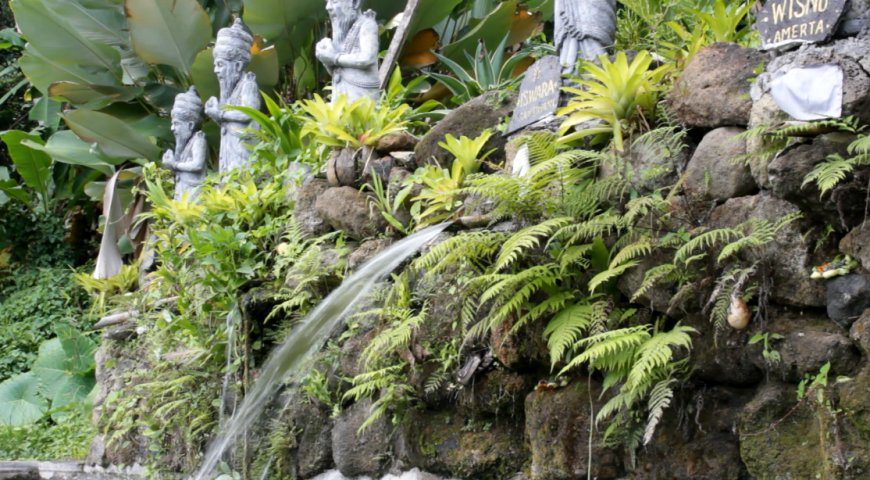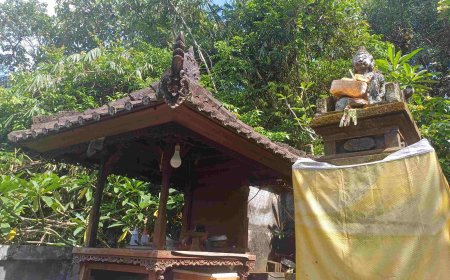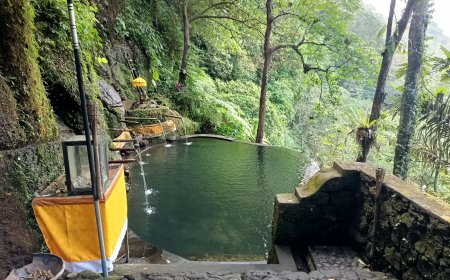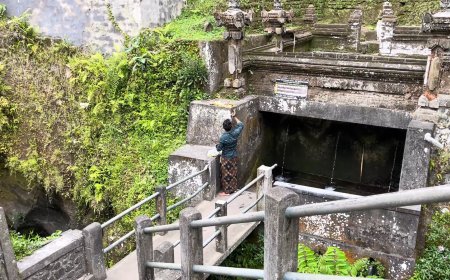Pasiraman Temple of Aan Village: A Sacred Site for Spiritual Cleansing and Reflection
A Sacred Pancoran in Aan Village, Klungkung, offers a spiritual tourism destination for melukat rituals, a traditional Balinese cleansing ceremony to purify the body, mind, and soul. Visitors can immerse themselves in the sacred waters while embracing the tranquil and spiritual energy of the site.

Aan Village, located in Banjarangkan Sub-district, Klungkung Regency, Bali, is one of the traditional villages officially designated as a tourism village since 2021. This village offers a variety of tourist experiences, ranging from educational, entertainment, to spiritual activities. One of its most prominent spiritual destinations is Pasiraman Temple, a sacred place for melukat or spiritual cleansing.
Pasiraman Temple was established around the 1600s, originating from the journey of I Gede Pasek Gelgel, who was searching for twin banyan trees to establish a residence for himself and his siblings. During his journey, he discovered a clear spring and performed a purification ritual there. This spring was later named Pasiraman. The existence of this temple not only reflects historical values but also symbolizes harmony between humans, nature, and spirituality. To this day, Pasiraman Temple continues to serve as a symbol of purity and a site facilitating spiritual journeys for Hindu devotees and tourists alike.
The journey to Pasiraman Temple is quite challenging due to its location on higher ground compared to other destinations in Aan Village. Visitors must navigate winding, uphill roads surrounded by lush forests. The unpaved roads can become slippery, especially during the rainy season. Despite the challenges, this journey offers its own unique experience, allowing visitors to immerse themselves in the serene natural surroundings and listen to the calming sounds of nature. The uniqueness of this journey teaches visitors to appreciate the process of attaining inner peace, in line with the philosophies of Balinese Hinduism.
Upon reaching the temple, all difficulties experienced during the journey are rewarded with breathtaking views. Visitors are greeted by a stunning combination of traditional Balinese architecture and a tranquil, spiritual natural environment. The temple is surrounded by lush trees, adding to its sacred and serene ambiance. This location is ideal for those seeking respite from the hustle and bustle of urban life, offering a space for reflection and spiritual rejuvenation. Moreover, the solemn and peaceful atmosphere makes the temple an excellent place for introspection and spiritual reflection.
Pancoran Panca Dewata (Source : Private Collection)
The melukat area is located in the outer courtyard or jaba pura of the temple. Here lies a large pool with several holy water spouts adorned with sacred statues, known as Pancoran Panca Dewata. These spouts symbolize the five primary deities in Hinduism: Brahma, Shiva, Mahadewa, Iswara, Vishnu. The water flowing from these spouts is exceptionally clear, sourced directly from natural springs in the temple area. This clarity not only symbolizes purity but also provides a refreshing sensation for the body and mind. Many visitors report feeling spiritually connected after performing melukat here.
Each water spout carries symbolic meanings marked by sacred scripts. The "Sang" spout produces tirta sanjiwani, representing purification—a complete cleansing of negative energies. The "Bang" spout releases tirta kamandalu, believed to have the power to release sins and emotional burdens, leaving individuals feeling lighter and free. The "Tang" spout produces tirta kundalini, symbolizing the eradication of evil, cleansing the soul of negative influences that hinder one's spirituality.
The "Ang" spout provides tirta mahatirta, believed to bestow spiritual strength and inner peace. This water is often used by those seeking encouragement and confidence to face life's challenges. Lastly, the "Ing" spout flows with tirta pawitra, which cleanses all negativity and fosters harmony in one’s life. The melukat ritual using these five waters creates a profound experience, where each stream of water touching the body conveys a deep spiritual message.
Visitors performing melukat can also take tirta from these spouts for personal use, guided by a jero mangku (temple priest), who explains the significance of each spout and guides the cleansing process. The ritual typically begins with a prayer at the sacred site using simple offerings, such as banten pejati or canang. This process not only spiritually cleanses the body but also instills a sense of gratitude for the sacred and abundant gifts of nature.
The 3 Dragon Pancoran (Source : Private Collection)
Apart from the Pancoran Panca Dewata, there are three other sacred water spouts flowing from dragon statues: Naga Basuki, Ananta Boga, and Taksaka. These waters are not used for melukat but for purifying pralingga and tirta upakara during sacred rituals. These three spouts symbolize harmony and protection, enhancing the spiritual aura surrounding the temple. The presence of dragon statues also serves as artistic elements, adding to the temple’s visual appeal. Each dragon embodies significant aspects of life: Basuki for blessings, Ananta Boga for prosperity, and Taksaka for protection.
Pasiraman Temple in Aan Village is not just a place of natural and architectural beauty but also offers profound spiritual experiences. Visitors can find tranquility, self-reflection, and strong spirituality in this location. Additionally, the temple serves as a reminder of the importance of maintaining balance between humans and nature. Despite the challenging access, the beauty and serenity offered make it a must-visit destination, whether for spiritual purposes or simply to seek peace. Every element of Pasiraman Temple conveys a message to live in harmony with nature and honor the traditional values passed down by ancestors.
With all its uniqueness, Pasiraman Temple has become an integral part of Aan Village’s identity as a tourism village. Not only Hindus but also tourists from various backgrounds can appreciate the beauty and tranquility offered by this place. For anyone visiting, Pasiraman Temple is a site where natural beauty, spiritual values, and tradition unite into an unforgettable experience.






























































